South Bethlehem is a collage of cultures. Residents wonder if that can continue.
This article was produced as part of a project for the USC Annenberg Center for Health Journalism’s 2021 National Fellowship.
Other stories by Sara Satullo include:
Are you a renter in Southside Bethlehem? We want to hear from you.
2 new projects slated to bring 95 new apartments to Bethlehem’s 4th St.
The fight for the heart of a South Bethlehem community
Will we recognize South Bethlehem after a real estate boom and pandemic? Introducing Edged Out.
Deal gives displaced South Bethlehem residents, businesses more time
Lehigh’s growth exposes a hard reality about South Bethlehem’s real estate market
The fallout when you’re Edged Out
Bethlehem Southsiders show ‘striking’ love of community, optimism about future, forum report says
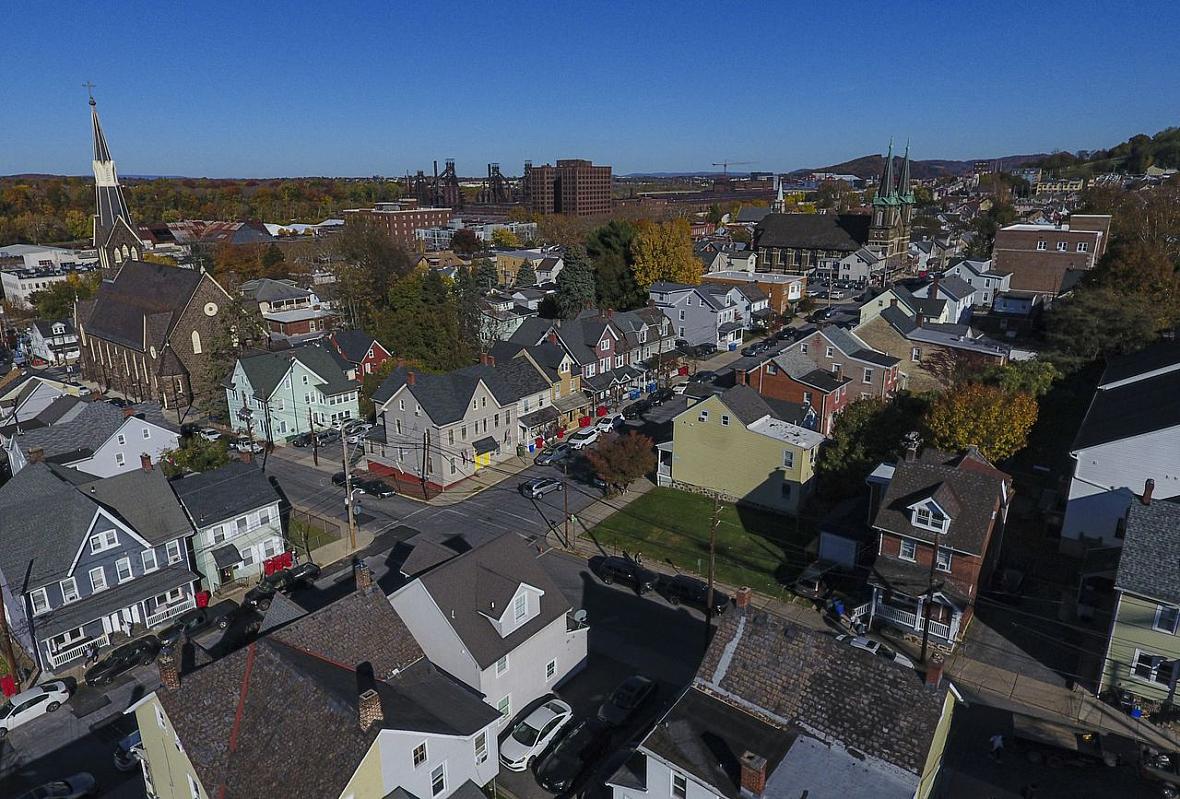
Those who treasure South Bethlehem love its mixing of cultures.
Saed Hindash | For lehighvalleylive.com
South Bethlehem is shedding its gritty, industrial roots for a new chapter that current residents hope doesn’t leave them behind.
Throughout the reporting of “Edged Out,” lehighvalleylive.com and The Express-Times asked Southside residents to reflect on what they treasure about their community and what could make it hard for them to stay here.
Residents shared their dreams, hopes and fears for their chosen home. Common themes emerged amongst Southsiders with vastly different life experiences. Diversity topped every person’s list of things they love about their community. Complaints hinted at the tradeoffs of urban living — parking, street noise and trash pickup. Almost everyone worries about housing affordability.
The latest installment of Edged Out is a multimedia dive into the lives of seven Southsiders.
We invite you to meet:
- A super-volunteer living in the city’s public housing.
- A Lehigh University administrator working to break down systemic barriers for Southside children.
- A former nonprofit- leader-turned-community-organizer using data and consensus building to improve South Bethlehem.
- A single mother who got a boost to homeownership via two nonprofits and now sits on their boards.
- A woman with deep familial roots in South Bethlehem who worries it will cease to be a place first-time homebuyers can build generational wealth.
- The globetrotting nephew of a former Lehigh Valley congressman who has devoted his life to helping the Latinx community via social justice around the world and at home.
- A Lehigh University professor who views his neighborhood as a living testament to the generations of immigrants who came here in search of a better life.
They’ve all traveled different paths and faced different struggles, but they’re united by their love of South Bethlehem.
Roy Ortiz
Roy Ortiz found his own version of paradise when he moved from Harlem to South Bethlehem’s Lynnfield, a public housing development.
He’s a super volunteer serving on the Bethlehem Housing Authority Board, heading up the Southside Little League and running Lynnfield’s community center.
He strives to be a role model for neighborhood children as Hank Welsh did for him when he lost his father at 8.
Carolina Hernandez is a lifelong advocate and Lehigh's assistant dean and direction of the Community Service Office. Courtesy Lehigh University | Christa Neu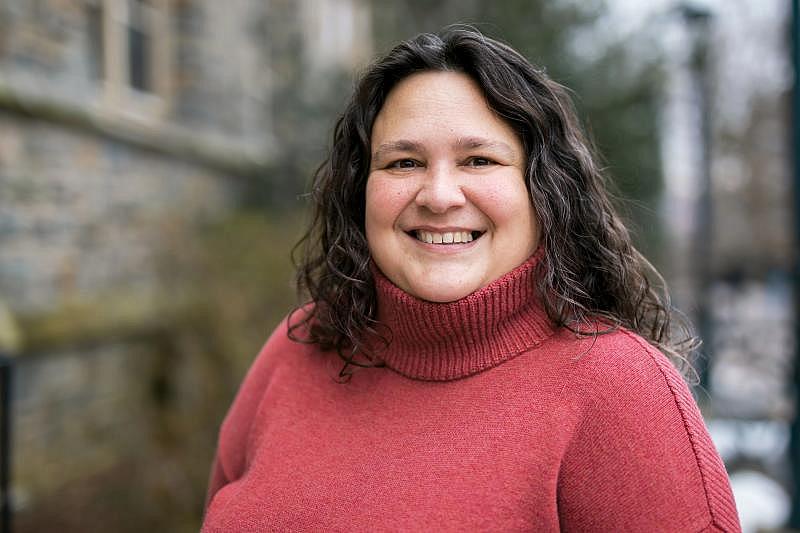
Carolina Hernandez
When Carolina Hernandez moved to South Bethlehem in 2001, she paid $300 in rent for a house on Summit Street.
One night walking home from her new job at Lehigh University, Hernandez introduced herself to kids playing on the sidewalk. Hearing her Latina last name, one of the students replied, “My mom works at Lehigh. too. What building do you clean?”
The innocent question marked a pivotal moment in the Cuban American’s career. She realized the only role these Broughal Middle School students saw for themselves at her private university was cleaning the floors.
“They never stepped foot on campus,” Hernandez, who is now assistant dean and director of Lehigh University’s community service office, recalled. “That was unacceptable.”
So, Hernandez sat down on the sidewalk and asked for their input. The students’ ideas grew into Spooktacular, Spring Fling and Living La Vida Lehigh, annual events that, pre-pandemic, drew 600 to 1,200 people onto campus.
“We’re making college accessible, something not hidden behind this invisible fence that existed. It was so crucial for us to break that down,” Hernandez said. “Is it perfect? Absolutely not.”
Today, Lehigh University is the lead community school partner for every Bethlehem Area School District school in South Bethlehem, funding community school coordinators, operating a popular homework club and supplying schools with more than 200 student mentors and tutors. It means that every Southside student visits Lehigh’s campus multiple times over their schooling and regularly spends time with college students, Hernandez said.
The community schools model spearheaded across the region by the United Way of the Greater Lehigh Valley seeks to dismantle systemic barriers for students and families. Those community schools have turned into lifelines for district families struggling with housing instability throughout the coronavirus pandemic. Today, it is tough to find a one-bedroom apartment for $1,100 a month, let alone the $300 Hernandez once paid.
The booming real estate market has meant very little inventory despite lots of available rental assistance.
“There is no place to put them. It is not (just) the funds,” Hernandez said. “We literally cannot find housing for everybody… It has just been a colossal crisis in our community. It feels really dark at times.”
Hernandez’s own rent jumped during the pandemic.
The response when she called her landlord to see if there was any wiggle room: “‘If you don’t stay, we will find someone at the higher price.’ There was no hesitation.”
She constantly considers the role Lehigh could be playing in the housing market.
University data show the 1,500 students living off-campus has remained level for the last five years. But she asks herself: Should Lehigh explore only allowing seniors to live off campus? Is this just a symptom of the Southside’s renaissance? What can be done?
“I am a firm believer that we have a duty to make developers have a huge chunk of their properties be at affordable market value for our residents,” Hernandez said.
Anna Smith
The South Bethlehem native hopes to raise her bicultural family in her hometown, but worries the tight real estate market may make it tough to find a larger home when the time comes.
The former executive director of Bethlehem’s Community Action Development Corp. channels her free time into data-driven community organizing with a focus on solutions.
Lidia Gonzalez realized her dream of home ownership in South Bethlehem with the help of two nonprofits. Here she stands in front of her home Wednesday, February 9, 2022. Donna Fisher | lehighvalleylive.com contributor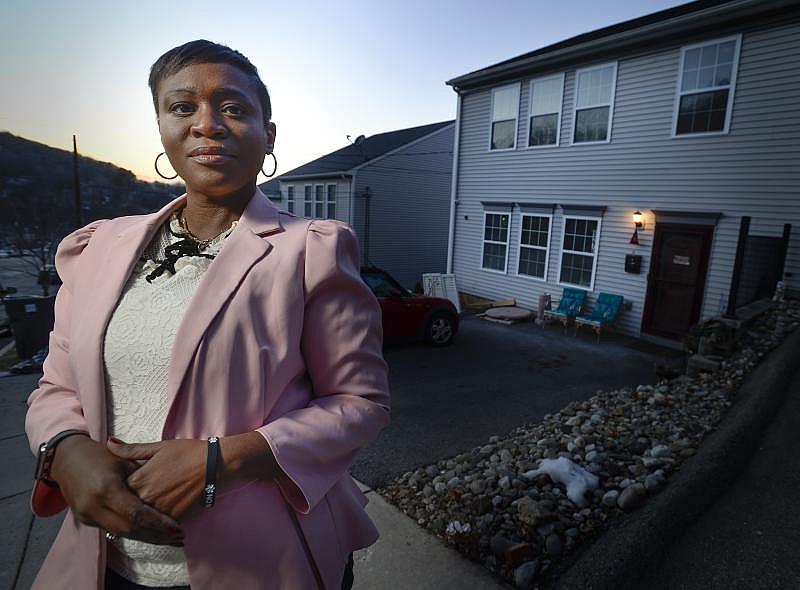
Lidia Gonzalez
Lidia Gonzalez took a hard look at her life when she turned 30.
The single mother of two felt like she’d yet to accomplish anything. So, she enrolled at Northampton Community College to finish a college journey she’d begun more than a decade before.
“I told my kids we were going to struggle for a bit when I went to Northampton. I took them when I went to register… They were like, ‘Go mom, go,’” the 39-year-old recalled. “I promised I was going to graduate and I was going to get a job and buy them a house.”
Gonzalez delivered on those promises. Today, she’s a homeowner, college grad and owner of her own notary business.
Gonzalez bought her home on Eighth Street in 2016 through Housing Opportunity Movement (HOM), Inc., a local nonprofit dedicated to adding affordable homes to Bethlehem’s housing stock. She now sits on its board. To make the townhomes on Eighth Street affordable to low-income buyers, HOM underwrote a forgivable second mortgage funded through a federal housing grant. To qualify, a buyer needed to earn 80% or less of the region’s median annual income. The homes were also available to traditional buyers.
Gonzalez couldn’t have bought the house without the aid of the nonprofit and the help of Community Action of the Lehigh Valley’s first time homebuyer’s course. The course taught her she needed a bank pre-approval and an inspection, things she didn’t know coming from a family of renters.
“The house was being sold for a lot more than my loan was for,” Gonzalez, who now sits on the HOM and Community Action board, said. “...These programs do make it a lot easier for borrowers like me to be able to afford it in the first place.”
The high cost of property took HOM out of the construction business, said Dana Grubb, the group’s treasurer. The nonprofit now focuses on helping first time homebuyers with closing costs.
Fulfilling her promise to her daughters and staying in South Bethlehem meant the world to Gonzalez. Although, it was a long road to graduation and her real estate closing.
Gonzalez’s immigrant family moved to Bethlehem in the late 1990s. She earned a scholarship to Penn State University, but forfeited it when she transferred back to the local campus after struggling.
Work took priority once she became a mother. She found an affordable home on Evans Street, where she and her daughters lived for more than a decade. Sometimes she worked two jobs, and at times, relied on a Section 8 voucher to pay her rent.
“I used the (Section 8) program for what it was meant for: to better myself,” Gonzalez, who worked as tax preparer, notary and at the student housing company Campus Hill, said.
She was lucky to obtain a voucher and find a landlord willing to take it. Some landlords are reluctant to rent to folks receiving the voucher because the program holds landlords to stringent housing quality standards, said J. Marc Rittle, executive director of New Bethany Ministries. But it does provide a landlord with a steady income stream, he notes.
“I don’t understand what the issue is with people not taking it because it is guaranteed money,” Gonzalez said.
The home on Evans Street offered her family financial stability as she pursued her dreams as well as close proximity to their favorite parts of South Bethlehem. The Greenway became an extension of their backyard where her girls learned to bike and skate.
“We could just walk to Musikfest and see the fireworks from my bedroom window. I love being around here,” she said. “People are friendly and there is so much diversity.”
Those are the things that kept Gonzalez anchored to South Bethlehem when she began house hunting. Her community circle widened on her new block and it rose to support her when she was diagnosed with breast cancer in 2018.
“They were very supportive when I was sick,” she recalled. “I was very, very lucky.”
Delia Marrero
Delia Marrero is a single mom. A high school dropout. A two-time college graduate. And now a homeowner and graduate student.
She’s grappled with poverty and seen the power of education to lift her family financially.
She’s worried South Bethlehem soon may cease to be a place for folks without a perfect credit score or intergenerational wealth to catch up.
Lawyer and advocate Fred Rooney spends much of his year traveling the globe for work. But South Bethlehem remains home. Courtesy photo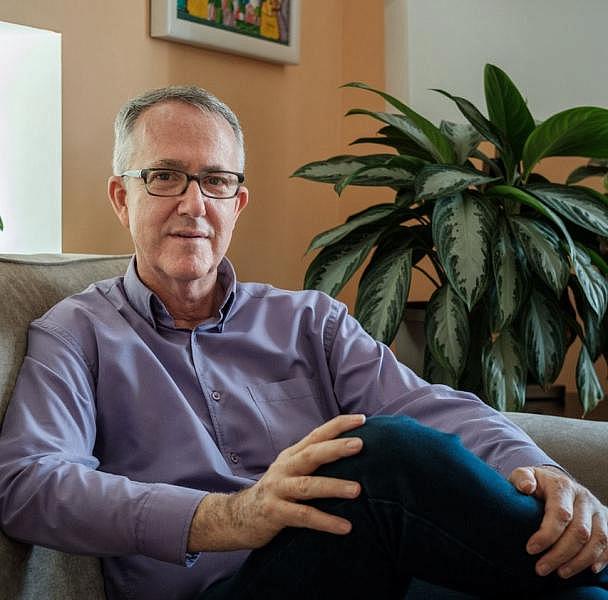
Fred Rooney
Fred Rooney doesn’t much care that his apartment offers no outdoor space. South Mountain is his backyard.
“This was always home,” Rooney, who is the nephew of the late Lehigh Valley Congressman Fred B. Rooney Jr., said.
The globetrotter climbs to the top of the hill twice a day when he is in Bethlehem. The urban terrain rapidly changes as he hikes from his home by Lehigh University’s Farrington Square to the top of Mountain Drive. The only constant is the incline.
Blocks of student housing — the signs with landlords’ names really grate on Rooney — give way to tidy homes on Hayes Street and steep slopes as his long legs climb the vertical of Ridge and State streets. He points out the beauty he sees in the mundane — tiny well-kept gardens and window decorations — as well as the vistas the height affords.
“It destroys the character of the neighborhood.,” Rooney said, about the signs student housing landlords place on properties.. “You are living in what looks like a marketplace.
He stops to chat with others on the street, surprising some with his quick Spanish; picked up studying abroad in Colombia during his junior year at Moravian College and perfected working in South Bethlehem. Rooney grew up in Long Island, N.Y., but family ties and his dad’s job at Bethlehem Steel Corp. often brought them back to South Bethlehem, where the first stop was always Pete’s Hot Dog Shop.
“This was always home,” Rooney said.
Looking to keep his Spanish fresh after his time in Colombia, Rooney got involved in the Spanish-speaking Southside community. His work shed light on the difficulties and systemic barriers facing marginalized groups, who often lacked legal representations. It spurred Rooney to law school.
“Housing should really be looked at as a human right and you should have competent representation,” Rooney said.
He returned to Bethlehem as a legal services attorney, but the pay was so low, Rooney, now a married father of two, needed public assistance to pay the bills. After a year, he opened his bilingual law practice with a partner in Southside in hopes of bringing in more cash. Many thought his location choice was crazy.
“I told them the Southside is part of my soul,” Rooney, who now lives in his former office space, recalled.
His Spanish-speaking abilities brought in a flood of clients needing his help sorting through tenancy, Social Security, workers comp and other issues. He fought for residents living in substandard housing and filed — on behalf of two Hispanic women — the federal lawsuit that led to the creation of regional Bethlehem Area School Board seats.
His work in South Bethlehem taught him to “do well to do good,” the idea you first must be able to provide for yourself to offer pro-bono work. He took all he learned about running an economically viable, law practice with a social justice bent back to his alma mater City University of New York School of Law’s to direct its Community Legal Resource Network.
In 2007, he designed the first incubator for justice program and today has scaled it worldwide. It teaches lawyers how to start financially-sustainable law practices that meet community needs. Today, he is a Fulbright Specialist and his incubator work takes him from Pakistan to the West Bank to the Dominican Republic. Locally, he’s a devoted hospice volunteer.
No matter where his work takes him, South Bethlehem remains his home.
“It is a privilege to live right here,” Rooney said from the South Mountain lookout.
Lehigh University Professor Seth Moglen has called Hillside Avenue, in Bethlehem home since 1999. Here he walks on his front porch Wednesday, February 9, 2022. Donna Fisher | lehighvalleylive.com contributor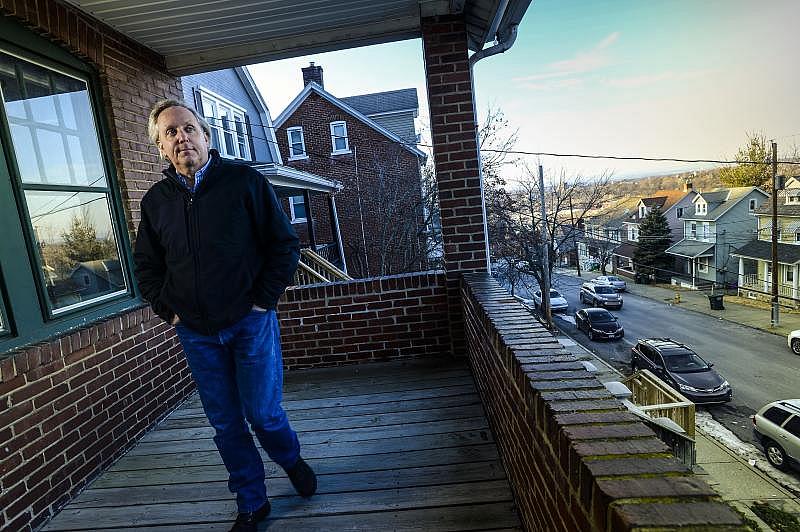
Seth Moglen
As a historian and literary critic, Seth Moglen found Bethlehem intoxicating when he moved here in 1999.
The New York City native relocated to take a job at Lehigh University knowing very little about Bethlehem. First settling on Main Street, he walked to work. His commute traversed the historic Moravian settlement, crossed the Fahy Bridge with views of the Bethlehem Steel plant and then climbed South Mountain.
“My God, the entire history of this society is written into the land here in a single square mile,” Moglen said. “I can think of no comparable place.”
Moglen, who grew up in a union family, instantly felt at home in South Bethlehem, where former steelworkers still populated any bar or restaurant you popped into. Many were living in homes they or their families built with their own hands.
“The people living in these neighborhoods felt deeply familiar to me,” Moglen said. “They resembled working class people I had known all my life.”
He and his wife bought a home on Hillside Avenue in an area colloquially dubbed Slovak Hill for the immigrants who communally built the neighborhood. Their realtor tried to steer them towards higher income areas of the Lehigh Valley, places other Lehigh professors live. They opted for the $90,000 house overlooking the Southside.
Some outsiders view the Southside as a dangerous place. Yet, when Moglen bought his home there was no lock on the backdoor. He quickly learned his block shoveled out elderly neighbors first and folks picked up groceries for each other.
“There is nothing level in my house, there is nothing square in my house,” Moglen said. “My house was built by immigrants who didn’t know how to do this, but they were good with their hands and they were determined.”
Today, many of Moglen’s original neighbors are gone, replaced by student housing rentals. He contends with DeSales University fraternity brothers next door.
Some may view South Bethlehem’s aging housing stock as shabby and ready for a bulldozer. Moglen sees in those same homes the living embodiment of generations of immigrants who left their homeland in search of a better life. They labored in the Steel plant and garment mills for subsistence wages to build homes, churches and vibrant communities. Moglen acknowledges those insular ethnic neighborhoods carried their own flaws.
But Bethlehem today risks losing that rich history in favor of sterile new development at home in any city in America, Moglen said. Young people and middle-aged professionals want to live in dynamic communities with soul and an identity. Bethlehem has that in droves and its rebirth offers a shot at bringing it to its most vibrant and livable point in its history, he believes.
“There are not a lot of cities in the United States left that have this,” Moglen said. “This thing is utterly remarkable and precious.”
Our journalism needs your support. Please subscribe today to lehighvalleylive.com.
Sara K. Satullo reported this story while participating in the USC Annenberg Center for Health Journalism’s 2021 National Fellowship, which provided training, mentoring, and funding to support this project. She may be reached at ssatullo@lehighvalleylive.com.
[This article was originally published by Lehigh Valley Live.]

